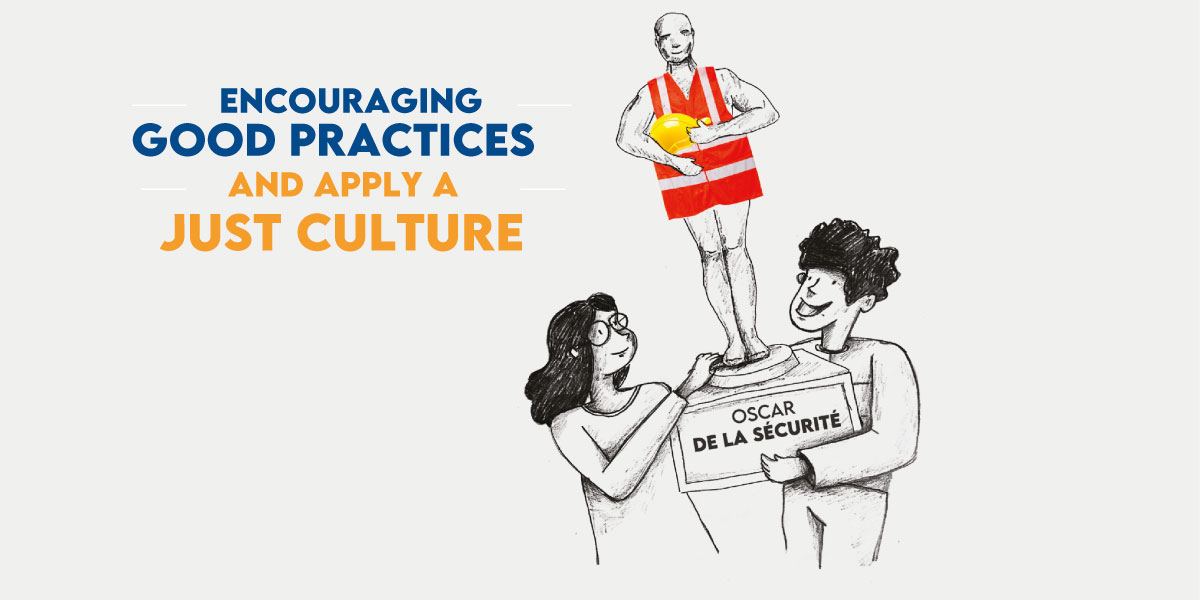A just culture: encouraging trust and reporting
 A just culture: encouraging trust and reporting
A just culture: encouraging trust and reporting
Deploying a ‘just culture’ in your organization means creating the conditions of trust that are needed to encourage the smooth flow of information. It also means defining the behaviors that should be recognized and rewarded and, conversely, the unacceptable behaviors that must be sanctioned. Identifying and applying a ‘fair response’ is an essential ingredient of safety leadership. This is the fifth leadership principle.
| What is a just culture? |
| The notion of trust is at the heart of a just culture |
All employees appreciate being able to anticipate the reaction of their managers following an initiative or an error.
The rules must be clearly established. A colleague who has noticed a malfunction will be encouraged to report it if the person knows that his or her safety initiative will be rewarded. Similarly, it is important for staff to know that if a conscious error is made, the response will be fair. Even if, in some cases, this might end in a sanction, the response will be based on a clear methodological framework, and well-established rules that apply to everyone. Trust is built upon the ability to predict the consequences of an action.
On the other hand, mistrust is fostered by arbitrary decisions. Sanctions that are based on the state of mind, or even the mood of a manager will be neither understood nor accepted. The first victim of a lack of trust in the organization is the flow of information. Because an employee who thinks that he or she could be arbitrarily sanctioned for making a mistake is likely to try to hide it from his or her manager. Similarly, an operator who reports malfunctions and never receives a thank you, may become discouraged and stop reporting information. And when organizational silence takes hold, both information, and potentially dangerous situations are not reported. Consequently, they are neither addressed, nor taken into account in prevention strategies.

Organizational silence, the biggest enemy of safety
Organizational silence describes a situation where important information is available at the field level, but does not (or no longer) leaves the field. While many psychological or organizational mechanisms play a role, the lack of a fair response to reports or events is one of the main organizational mechanisms.
Download François Daniellou’s views on organizational silence
| How is a just culture developed? |
To maintain trust and a certain degree of freedom of speech, the hierarchy’s response to errors, deviations or transgressions must be consistent, understood by everyone, and predictable.
Safety leaders play an essential role in this. They are expected to:
- Create the conditions of trust so that everyone feels able to report, and act on any safety-related information
- Hammer home the message about red lines that cannot be crossed: these clear rules establish which behaviors are acceptable and which behaviors are unacceptable; they can be compared to the ‘golden rules’ that govern the prevention of the most serious risks.
- Reward positive actions: acknowledge a safety initiative, encourage colleagues to pay attention to each other’s safety, etc. This not only helps to anchor safe practices, but is also a powerful driver of motivation and commitment!
- React appropriately and consistently to a deviation: this implies acknowledging the right to make a mistake, treating people fairly, etc.
The mistake to avoid? Managers who sit in their offices and draw up their own lists of incentives and sanctions. If you want everyone to understand and accept some key rules that are vital to the organization, nothing beats dialogue and co-construction.
A just culture is good for safety... but, above all, the rest of an organization!
| Read more about the 7 principles of safety leadership |





